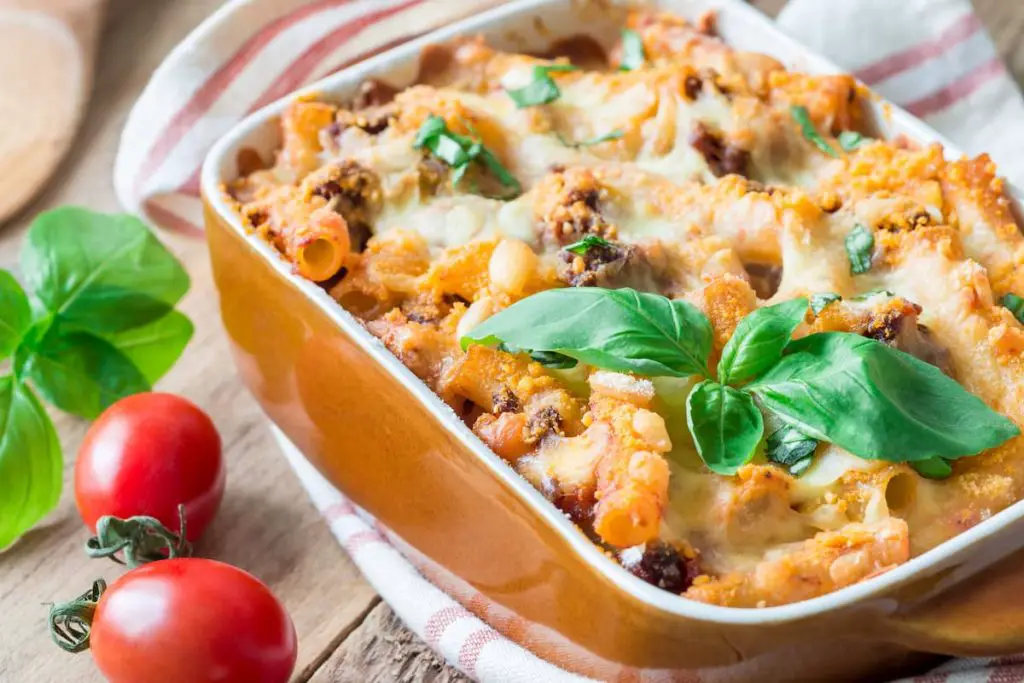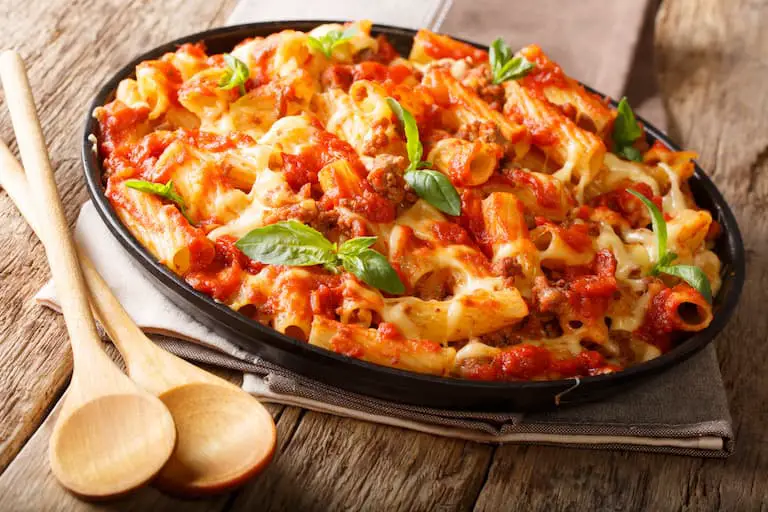Can You Freeze Ziti? (YES! Here’s How)
Ziti is one of those foods where you tend to make more than you bargained for. The combination of meat, noodles, cheese, and tomato sauce comes with plenty of second helpings for everyone and leftovers to boot. You may be wondering if your family needs to eat ziti for the foreseeable future or if you could freeze it for a rainy day.
You can freeze baked ziti as long as you keep it in an airtight, sealed container. Ziti casserole, when properly frozen, will maintain its quality and taste. You can keep ziti in the freezer for up to two months or longer.
Freezing food is a great way to prevent food waste. Below I’ll talk about some rules for freezing your food, food safety in the freezer, and how to freeze your baked ziti most effectively.

Can You Put Baked Ziti in Your Freezer?
Most foods are safe in the freezer, with just a few exceptions. Even with the exceptions, though, best practices for freezing might help you get away with freezing almost anything. So whether you’ve made more baked ziti you could eat or are looking for a good freezer meal for a friend, don’t worry because ziti has you covered.
You can put baked ziti in your freezer as long as it’s in a sealed dish or bag and has cooled down. Placing hot food in the freezer can add extra moisture and cause freezer burn. Additionally, the taste or texture might change once you thaw it out.
Baked ziti is typically made with pasta noodles, cheese, sauce, and meat. These ingredients can be frozen separately or together once they are compiled into the dish.
Additionally, ziti is one of those foods you can cook in the oven and freeze once it’s cooled, or add all the ingredients to a ziti casserole dish and freeze for cooking later.
The Ingredients in Ziti Are Mostly Freezable
When you think about the composition of ziti ingredients separately, its safety in the freezer may become more apparent. Most ziti recipes include:
- Ziti noodles
- Meat (ground beef or sausage)
- Cheese (shredded blend or ricotta)
- Tomato sauce
It’s commonplace to put ground meat in the freezer, save tomato sauces that way, or even freeze bags of spaghetti noodles if you’ve made them. Three of those four things are what we’d typically store in the freezer if we had an excess of it anyway. The only thing slightly off in this recipe is the cheese—that can be pretty hit or miss when it comes to freezing.
Many of us are used to freezing shredded cheese or even deli cheese slices. If you use it in your recipe, ricotta is its own unique classification of cheese. It’s creamier and thicker than your typical mozzarella block. For this reason, it might be less than ideal for freezing on its own.
However, if the cheese is already mixed into your ziti casserole, it will make a difference. Don’t be surprised by texture changes, though.
You can find many recipes online for freezer-safe ziti. Typically, this just removes or lessens the content of the ricotta cheese.

Don’t let these recipes freak you out, though. As long as you follow the best practices for freezing foods, like putting things in airtight containers and letting them cool, you probably won’t need to worry about having a “freezer-safe” recipe. Everything listed is already pretty freezer-friendly.
Use the Right Storage Options for Freezing To Prevent Moisture Loss
When you freeze food, you inactivate all microorganisms that may cause foodborne illness. Frozen food can’t mold, as the cold temperature inhibits the freezing process. As a result, you can keep food out of the trash or fridge (where it might eventually end up in the trash), saving you money and time.
It’s not all rainbows and sunshine, though. You may have noticed that sometimes, food tastes a little different or feels different after freezing—this is a result of moisture loss. To combat this, you should prevent moisture loss however you can, with jars, bags, foil, or paper specifically made for freezing. The moisture loss or addition of extra moisture makes food feel and taste different once they have been frozen.
Additionally, no matter what you are cooking, you should always let it cool before sticking it in the fridge or freezer. Doing so helps prevent any texture changes and keeps your food safe from foodborne pathogens.
Bottom Line: You Can Freeze Ziti
As long as you’re following the rules of thumb for freezing, most things are pretty freezable. You’ll find special recipes online for doubling your meals by freezing a batch. Companies even make unique dishes for freezing soups or liquids.
Ziti is a terrific meal to make ahead of time and freeze extra portions. Remember to follow the rules of thumb above to ensure that you aren’t losing too much moisture or changing the texture too drastically.
How To Freeze Ziti
Food safety is essential, and the taste and texture of your ziti are important, too. The way you freeze your baked ziti will make all the difference in both.
To freeze ziti, cook as normal, let it cool, and then place it in an airtight container with a lid or sealable lock. Then, you can place it in your freezer for up to two months. Additionally, you can freeze it without cooking it first, as well.

Many casserole dishes come with an airtight lid to easily store your food in the fridge or freezer. The most important tip here is to let everything cool down thoroughly so that there’s no freezer burn when you open it back up. When you let the steaming hot food bubble under an airtight lid, condensation will cover the top layer and eventually freeze, creating freezer burn. This is not ideal for taste and texture!
You could also cook things separately and freeze them, or you can stop short of the final bake. Regardless of whether or not you combine all your ingredients and bake for an hour or two, as ziti typically calls for, you’re going to have to bake it again once it thaws.
I can’t tell you which process is better—that’s up to you! If you give the extra batch away to someone who needs a little extra love, you might consider baking it twice to save them some time. However, suppose you’re short on time during your pre-freeze process. In that case, it’s perfectly acceptable to freeze the prepared dish and bake it once you’ve removed it from the freezer later.
Additionally, you should always label your ziti before you put it in the freezer. You’d be surprised what baked ziti might look like if you put it in the freezer six months ago and forgot about it. You can either buy little labels to place on your containers or add the date with a sharpie.
Ziploc Bags Are Great for Freezing Ziti
You don’t need to buy the fanciest new freezer or dishes or an airtight sealer to get your ziti in the freezer. Instead, ziploc bags make for awesome and easy thawing, as this video explains:
Air-sealed containers work great, but freezer bags work just fine too. They help to prevent air exposure and keep your food easily storable.
When you thaw your ziti out, remember to treat it like you would any other food. The freezing process inactivates the microbes living on the food, not kills them. You still need to follow best practices for food safety and make sure everything is thoroughly cooked. Thawing your ziti for a few hours before baking might help everything cook more evenly.
You Can Store Frozen Ziti Between 2 and 6 Months
Baked ziti is safe in the freezer for around two months before the taste and texture begin to be negatively affected. Your frozen ziti, however, will still be safe to eat up to the six-month mark. Just know that the longer your ziti is in the freezer, the more the quality or taste you are expecting might change.
For ziti, it’s always better to be safe than sorry. You’ll know that your ziti has gone wrong if there are any foul smells or things that don’t look right once you thaw it out. If you feel like you’re just being picky, consider how long you’ve had it in the freezer (this is why labels are essential!). If it has been more than two months, trust your gut and throw it out.
Can You Freeze Ziti – Summary
You can quickly freeze baked ziti if you have made too much or want to save it for later. Baked ziti also makes a great meal to give to someone who might not eat it right away but needs a home-cooked meal (those who have just suffered loss, had a baby, etc.).
Just make sure that you’re providing whoever you’re gifting the baked ziti with a well-sealed container to place in the freezer.






